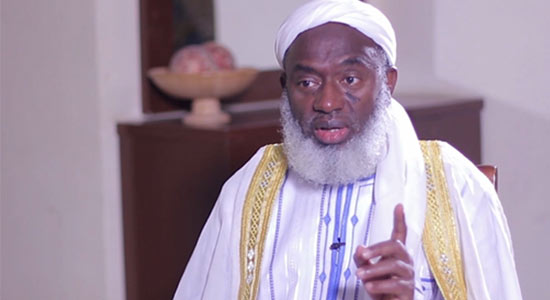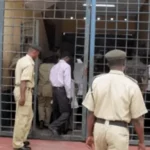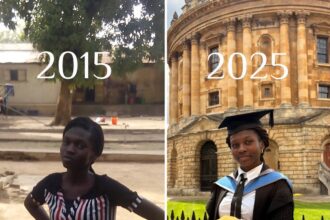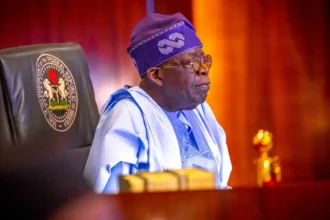
*Calls For Budgeting To Support Rehabilitation, Psychology, And Community Engagement
Renowned Islamic cleric and advocate for dialogue in resolving Nigeria’s security challenges, Sheikh Ahmad Gumi, appeared on Channels Television’s Morning Brief on Tuesday, where he reiterated his call for non-violent, reconciliation-based approaches to banditry and insurgency. In a wide-ranging discussion on national insecurity, religious tensions, foreign intervention, and amnesty for separatist leaders, Gumi positioned himself as a proponent of peace without bloodshed, crediting negotiation tactics for significant improvements in Kaduna State.
Gumi, who has long engaged directly with armed groups in northern forests, emphasized that his mission is to foster unity and stability through dialogue rather than military force. “I’m just looking at ways we can achieve peace without letting bloodshed happen. That is my mission, and I think many people understand it now. Some governments are even implementing it, and we are getting results,” he said. Highlighting progress in Kaduna a former hotspot for banditry he noted, “You see, I’m in Kaduna now, a hotbed of banditry. Things are getting much better. I can say maybe 90 percent of the state is calm. We’ve seen a scale down, at least in southern Kaduna, but generally things are not as improved as one would like to see in addressing bandits.”
Gumi argued against over-reliance on “kinetic” (force-based) responses, drawing global parallels to underscore their futility. “We have people who are ready to put down their arms, so why do you always decide it has to be kinetic?” he questioned. “Even America could not succeed in Afghanistan, even Israel could not succeed in a small strip of land. Our army is not designed for guerrilla warfare; no army is designed for the kind of people we are facing now.”
He cited the Fulani herdsmen as an example of groups amenable to peace talks, despite arriving armed due to distrust: “If you have been following, the Fulani herdsmen have been calling for peace. When you call them for peace, they come with their guns for many reasons. Can you call IPOB for peace? Can you call Boko Haram? I think the former president called for peace, and they came, but now it’s difficult to call for peace again. So anybody who inclines toward peace, I’m with him.”
Gumi defended his perceived sympathy toward perpetrators, framing it through a medical lens: “I’m a medical doctor. When you have an emergency, your first concern is stopping the bleeding, not even the fractures or other injuries. So I am concerned about those who are injuring or killing people. Imagine a madman in a market with a knife who has stabbed many people. My first aim is to get that knife from him, not attend to those already injured.”
He clarified that victim support is not his sole purview: “I’m not a government authority. My concern is that blood should stop flowing, and I’ve seen it firsthand. Government agencies and state governors can take care of victims. My focus is addressing the root causes. How do we use psychology, human sociology, and interaction to divert these people from the evils they have fallen into?”
Gumi extended his amnesty advocacy to Nnamdi Kanu, the detained leader of the Indigenous People of Biafra (IPOB), recently convicted on terrorism charges: “This Kanu, imprisoned for terrorism for inciting attacks on soldiers—if he shows remorse and calls for peace, I will be at the forefront advocating for his pardon and amnesty.”
He drew historical parallels: “Look at Shagari; he gave amnesty to Ojukwu. Umar Yar’Adua gave amnesty to Niger Delta militants, who had also committed acts of terrorism. This is the approach we need.” He distinguished communal conflicts from individual crimes: “Communal clashes are different from individual criminality. After the civil war, atrocities were committed on both sides, yet communal actors were pardoned. Individual crimes are judged differently, but communal reconciliation focuses on stopping the bleeding.”
On forgiveness as a national virtue, Gumi said: “We have lost leaders, including Sona and Murtala, and we still advocate for peace. We forgive, and that should be Nigeria’s strength.”
Addressing claims of a “Christian genocide” in the north, Gumi dismissed the narrative: “If you say there is genocide affecting both Christians and Muslims, nobody will argue. But a genocide targeting Christians specifically does not exist in Nigeria, as far as my knowledge goes.”
He framed insecurity as ethnic and resource-based, not purely religious: “The violence we see is due to fault lines between indigenous groups and settlers fighting over resources. This mirrors conflicts in Plateau, southern Kaduna, Katsina, and Zamfara.”
Gumi celebrated Nigerian unity: “Despite the agitation for a Biafran state, Igbos are thriving across Nigeria. Nigerians are united in markets, politics, and public service. We must resist narratives that seek to divide us.”
Warning against foreign intervention, he stated: “Foreign involvement, especially from the U.S., will make the situation worse. Nigeria must rely on itself. We have Christians and Muslims in government and the military; they are not persecuted.”
Closing on a unifying note, Gumi decried divisive narratives: “My stance on national issues should interest everyone who wants peace to prevail in Nigeria. Kaduna’s progress is proof that dialogue works. Our message is peace, and we must preserve Nigerian unity.”










![“May the Soul of Former President Bola….” – Imo Governor, Uzodinma blunders during Prayers [VIDEO]](https://keeploss.com/wp-content/uploads/2025/07/may-the-soul-of-former-president-bola-imo-governor-uzodinma-blunders-during-prayers-video-330x220.jpg)


